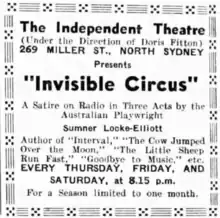The Invisible Circus (play)
The Invisible Circus is a 1946 Australian stage play by Sumner Locke Elliott set in the world of commercial radio drama, a field that Elliott knew well from many years writing for George Edwards. Elliott is represented in two characters, the idealistic Brad and the more jaded Mark.[1]
| The Invisible Circus | |
|---|---|
 Il Risveglio 5 Jun 1946 | |
| Written by | Sumner Locke Elliott |
| Characters | Bradley McGee Mona Natwick Speed Bette Lottie Faircourte Freda Chase Iris Mitchell Percy Kimlock Mark Cornell Courtney Skipton Henry Melville Bernard Freer Mrs. Goll J. B. Oliphant Mr. Bullerton Madam Napotelli Sinclair Bullerton JB Olliphant |
| Date premiered | May 1946 |
| Place premiered | Independent Theatre, Sydney |
| Original language | English |
| Subject | commercial radio |
| Genre | comedy farce |
| Setting | A commercial radio station |
Production history
A production by John Carlson ran for six weeks at the Independent Theatre, Sydney in 1946.[2] and in Melbourne later that year by the Little Theatre produced by Irene Mitchell starring Frank Thring.[3] The play was also produced in Adelaide.[4]
Reception
The Sydney Morning Herald drama critic felt the plays' "strength is dialogue, its weakness construction."[5]
The Bulletin felt it was "quick-moving and entertaining" although "A fault was the American-style smart retorts, which have become such an ordeal to the average picture-goer. Hollywood’s newspaper or business comedies always have some disillusioned, hard-faced female (frequently with a heart of gold) ready and waiting to fire her synthesised comments on Man and the world. And so it was in “The Invisible Circus” ; the same situations, the same openings, and click, like a well-oiled machine, the dis-illusioned damsel delivers the wisecracks in a tired, disillusioned voice."[6]
The Argus called it "bright and pungent entertainment."[7]
Leslie Rees thought the play "marked a great advance in originality" for Elliott's work, saying "Eschewing mawkish emotional situations, Locke-Elliott gave three acts of diverting farce-comedy." He added:
Invisible Circus had an opening not as sharp as it should have been; also it was reminiscent of the American Boy Meets Girl. As the play went on, it appeared to be as devoid of strong plot as had been Afford’s Mischief in the Air. But it was by the very means of not involving himself with complicated events that Sumner Locke-Elliott was able to release his gift for gay, extravagant, spontaneously gossipy but pointed dialogue. The second act was the best of it. The story conference, in which a new and idealistic script-writer’s opus was subjected to “office improvement’’, was extraordinarily funny. The rehearsal scene was good knockabout.[8]
Premise
A young and idealistic scriptwriter, Brad McGee, is introduced to commercial radio. The more jaded Mark Cornell winds up leaving radio.
Radio Adaptation
The play was adapted for radio by George Farwell in a production that aired in December 1946. The cast included Peter Finch and Elliott himself.[9]
The ABC produced the play for radio again in 1951 (directed by Doris Fitton)[10] and 1956.[11]
References
- Clarke, Sharon (1995). Sumner Locke Elliott: writing life. University of Woollongong. p. 289.
- "Young Playwright Visits North". The Cairns Post. Qld: National Library of Australia. 20 September 1946. p. 5. Retrieved 24 March 2013.
- "Sydney Playwright's Satire on Radio People". The Argus (Melbourne). No. 31, 304. Victoria, Australia. 30 December 1946. p. 10. Retrieved 17 October 2022 – via National Library of Australia.
- "Repertory To Produce "Invisible Circus"". The Advertiser (Adelaide). Vol. 89, no. 27415. South Australia. 17 August 1946. p. 7. Retrieved 6 September 2023 – via National Library of Australia.
- "Play's Premiere At Independent". The Sydney Morning Herald. National Library of Australia. 3 June 1946. p. 5. Retrieved 24 March 2013.
- "Satire on Radio.", The bulletin., John Ryan Comic Collection (Specific issues)., Sydney, N.S.W: John Haynes and J.F. Archibald (Vol. 67 No. 3460 (5 Jun 1946)), 1880, nla.obj-550178509, retrieved 6 September 2023 – via Trove
- "SYDNEY PLAYWRIGHT'S SATIRE ON RADIO PEOPLE". The Argus (Melbourne). No. 31, 304. Victoria, Australia. 30 December 1946. p. 10. Retrieved 6 September 2023 – via National Library of Australia.
- Rees, Leslie (1987). Australian drama, 1970-1985 : a historical and critical survey. p. 177.
- Australian Broadcasting Commission. (1939), "You Will Laugh and Laugh at Invisible Circus Witty satire on broadcasting", ABC weekly, Sydney: ABC (Vol. 8 No. 48 (14 December 1946)), nla.obj-1322144483, retrieved 27 August 2023 – via Trove
- Australian Broadcasting Commission., "RADIO PLAYS for NEXT WEEK A.B.C.", ABC weekly, Sydney: ABC (Vol. 13 No. 50 (15 December 1951)), nla.obj-1552253944, retrieved 6 September 2023 – via Trove
- Australian Broadcasting Commission. (1939), "RADIO PLAYS for NEXT WEEK A. B. C. COMMERCIAL", ABC weekly, Sydney: ABC (Vol. 18 No. 42 (20 October 1956)), nla.obj-1317765891, retrieved 6 September 2023 – via Trove
Notes
- Pender, Anne (2016). "Theatre Animals: Sumner Locke Elliott's Invisible Circus". Australasian Drama Studies. La Trobe University (68): 54–74.